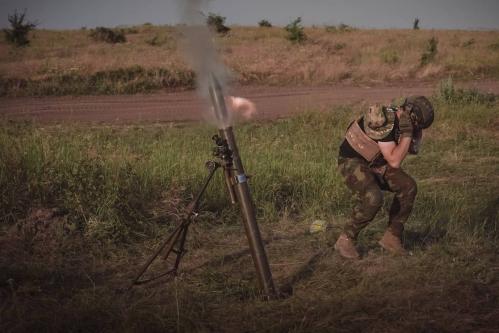By all accounts, President Obama reached his recent decision to supply arms directly to Syrian opposition groups with great reluctance. The president clearly understands that while getting into a war is easy, getting out is hard. The example of Iraq no doubt weighs heavily on his mind. But he also learned the lesson firsthand in Libya. After signing on to a limited mission, he was quickly forced to increase the level of U.S. participation or face the prospect of a rebel defeat.
Nevertheless, the delay in committing the United States to the success of the Syrian rebels is regrettable. More lives have been lost, and battlefield gains the insurgents enjoyed six months ago have been squandered. Regaining the momentum will take more than just the limited outside intervention currently contemplated. And even if it were possible to achieve the removal of Syrian President Bashar Assad on the cheap, his departure would no more guarantee peace in Syria than the overthrow of Saddam Hussein in 2003 brought stability to Iraq.
The fundamental point is this: A peace deal is not feasible under current conditions. It will require greater military effort up front and it will also require, in the end, international peacekeepers to implement it.
Moreover, U.S. troops in modest numbers must be part of that force. No other country has the necessary military enablers and the political clout to provide the glue in a multinational military coalition.
Benefit of delay
In this respect, the president’s reluctance to get involved has actually had a beneficial effect. It has dramatically demonstrated to America’s allies that the U.S. is indeed the indispensable nation. In one way or another, Britain, France, Turkey, Saudi Arabia, Jordan and Qatar — to name just six states — have all urged Obama to play a more robust leadership role.
This clamor for U.S. intervention is an entirely new factor in Middle Eastern affairs. It is also one that gives America much more opportunity to manage the risks of military intervention.
If Obama begins now to discuss the idea of a multinational force with his allies, he will make it easier to persuade them to support the rebels in a more coherent fashion.
In addition, the announcement will reassure Syrians of all sectarian backgrounds that the international community is fully committed to ending the violence. It will undercut one of the greatest psychological assets Assad has going for him: the feeling among many Syrians that they face a stark choice between Assad’s rule and the tender mercies of al-Qaeda plus a sectarian war.
With this kind of endgame publicly promised, we can then more effectively tackle the immediate challenge of shifting the battlefield momentum in the insurgents’ favor. We can provide not only light arms, but also heavier weaponry and even air support, if necessary. Having established the broader political and military objectives and parameters for our intervention in advance, such steps could be considered without risking all-out war.
How to oust Assad
To achieve its stated goal of forcing Assad to step down, the U.S. must also play a greater role in coordinating the military campaign of the Syrian rebels. Washington should see itself as both the strategic brain that identifies the key moves on the battlefield and the guiding hand that ensures that the different opposition elements are working together toward shared goals.
The calculus of Assad and his Iranian patrons will not change until Aleppo and Damascus are squarely and permanently under rebel control. These are the near-term strategic goals that the U.S. must set for the opposition, and the United States must work to give the rebels the support necessary to achieve them.
We cannot expect Assad and his inner-circle elite to accept exile until they are certain that the two major cities of Syria are beyond their control. And it is only after he has left the country for good that we will be able to use our military, political and economic leverage to begin the complex process of brokering a new political settlement in the country. Before that point, Assad will exercise a reign of terror over everyone within the territory he controls.
Although a detailed endgame for the Syrian conflict cannot be specified in advance, and will ultimately be a product of circumstances that we cannot yet foresee, it is important to have some clear sense of our overall strategy for the war — a sense that today is impossible to glean.


Commentary
Op-edObama Needs To Act Now On Syria
June 24, 2013